The rise of the text tattoo
- Published
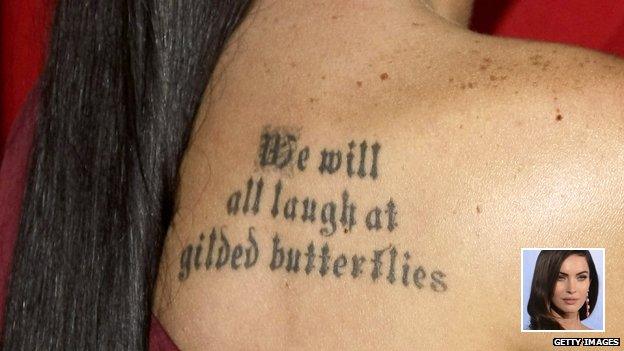
It probably wasn't on Shakespeare's radar that his work would one day unite Megan Fox, Danielle Lineker and Lindsay Lohan. But it has - they all have Shakespeare quotations tattooed on their bodies. Why are more people getting such high-brow inkings?
The trend for long pieces of script is part of the tattoo's journey from the margins to the mainstream.
Rarely a week passes without a celebrity being spotted with a defiant rallying cry, knowing aphorism or erudite quote inked on their bodies.
Angelina Jolie, the doyenne of written tattoos, was recently spotted with a long bit of text, external - thought to be Arabic - on her right arm. It joins a Tennessee Williams quotation, the Arabic word for determination, and the geographical co-ordinates of her six children's birthplaces, among others.
Literary quotations, song lyrics and philosophical musings are popular. Megan Fox took her Shakespearean tattoo from King Lear - "We will all laugh at gilded butterflies" - while Danielle Lineker chose "Our doubts are traitors and make us lose the good we oft might win, by fearing to attempt" from Measure for Measure, and Lindsay Lohan went for "What dreams may come" from Hamlet.
It's not all high culture, though. Harry Styles has a few words from George Michael's Careless Whisper on his feet, external - "never gonna" on his right foot and "dance again" on his left.
People often seek out the profound or portentous phrase. David Beckham has "Ut Amem Et Foveam" - So that I love and cherish - below wife Victoria's name, as well as the saying "Perfectio in Spiritu".
Script has always had a following in the tattoo subculture - "Carpe Diem" is a staple. But as techniques have improved, the lengthy quote has grown in popularity, says Stefano C, a tattoo artist at Frith Street Tattoo in London.
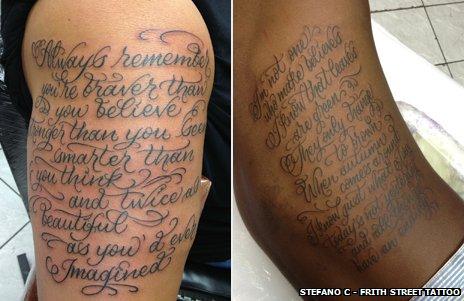
He had to fit AA Milne quote "Always remember you're braver than you believe, and stronger than you seem, and smarter than you think" between someone's arm and shoulder. It took up 10 lines. Many people have more personal text, such as a grandfather's favourite saying.
Length can be a problem. "People come in with a big essay. But in order to age well, it needs to be big letters," he says.
His focus is on making it look good. "It needs to be elegant and easy to read."
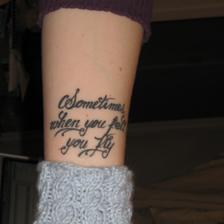
Meghan Jones's tattoo
Librarian Meghan Jones has a line from graphic novel The Sandman by Neil Gaiman on her arm - "Sometimes, when you fall, you fly." She had just left university and moved to London, and everything was in flux. The tattoo has helped her to conquer her fears, she says.
"It acts as a totem. It's something I think about when I'm not sure which way to go."
But why text and not a picture? "I can't think of an image that would have the same emotional meaning as a quote," she says.
Elis Ing, an American in London, has "Know ye now, Bulkington?" a line from her favourite book, Moby Dick, on her wrist. The quotation is about not taking the easy option, of being independent and not feeling the need to head to shore, even during the worst storm.
Ing grew up near the book's land-based setting of New Bedford, Massachusetts, but now lives in London. "I've lived here for 11 years and do get very homesick every once in a while. The line reminds me of the fact that I'm much better off here. London is almost that deep sea." By chance Moby Dick is the favourite book of her husband and once she realised, the tattoo was deployed to reel her beau in.

Simon Topps chose a line from a Kate Mosse novel
"Our friend Tom mentioned Moby Dick in passing and Adam said it was one of his favourite books. I rolled my sleeve up and said, "Oh, this Moby Dick?" as casually as I could. It was all very smooth for two big geeks," she says.
People stop to ask her what it means. "I do have to explain that chapter [about Bulkington] to a lot of people." But rather than put her off it, outlining the book's message to strangers has brought her closer to the text, she says.
Simon Topps, who runs a recruitment agency in Milton Keynes, has a line from the Kate Mosse novel The Winter Ghosts - "We are who we are because of those we choose to love and because of those who love us." It takes him back to his first holiday away with his girlfriend in Gran Canaria, which is where he read the novel. "It reminds me of my fiancee," he says. "I was a typical guy when I met her. She sorted me out."
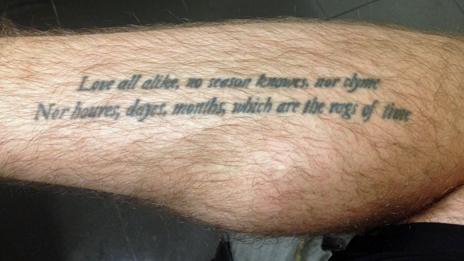
Nick Christian's tattoo
Nick Christian, a marketing manager in London, had part of metaphysical poet John Donne's The Sun Rising tattooed on to his leg in his final year at university. The lines - "Love, all alike, no season knows nor clime, Nor hours, days, months, which are the rags of time" - were intended to impress "a very smart girl" who had several tattoos. It was a doomed attempt.
But for a while the poem became a philosophy to follow about accepting things that can't be changed. "The truth is it's just about falling for a girl by accident and feeling a bit helpless," he says.
Some subcultures, such as metal, hip-hop or those based around graphic novels, are particularly fond of tattoos.
They can be inspiring, says writer and critic Sam Leith, but there are pitfalls. "Your tastes will probably change fundamentally. You may really think that Catcher in the Rye is the secret to your whole personality at 15. At 50, you probably won't. Something cryptic and short is better."
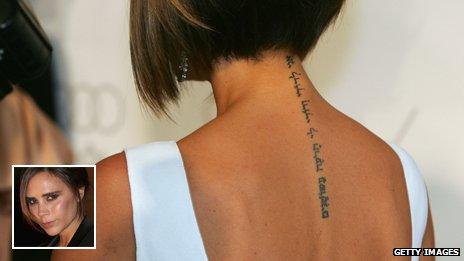
Victoria Beckham's tattoo quotes the Song of Solomon from the Old Testament
Why the musings of Danish philosopher Soren Kierkegaard or a Guns N' Roses lyric needs to be branded across someone's back might puzzle some people. Can't someone just keep it in their head?
Ing says the Moby Dick quote is about not wanting to forget that moment of connection. "I so wanted to remind myself. I didn't want to forget. I wanted my future self to remember that it's important to be independent," she says.
Like all tattoos there's a contradiction - of wanting to be unique and at the same time part of something, says Nina Jablonski, professor of anthropology at Pennsylvania State University.
"It's about establishing shared identity and signifying something important to that individual," she says. And there's the element of the icebreaker - that quote from Shakespeare, Dante or line from Nietzsche introduces you to someone.
There's also more than a soupcon of showing off, says Adrian Todd Zuniga, founder of Literary Death Match - in which writers read from their work in front of an audience, plus a panel of judges. The tattoo fits into an increasing hunger for literary cachet, he believes.
"We know from Death Match that people want to be and feel literary. It's the one thing that is everlasting and cool. They want to be perceived as bookish."
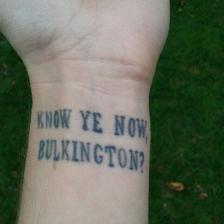
Elis Ing's Moby Dick tattoo
It doesn't always work, especially when the choice of text seems incongruous. Eyebrows were raised when Danielle Lloyd sported a Latin quote that probably intended to capture Nietzsche's "What does not destroy me, makes me stronger" philosophy, but actually translated as, "Who I wear away for me only for me strong".
There's another question that bothers the literary purist. Does this person really understand the author's meaning? Megan Fox may know the meaning of the "gilded butterflies" speech. "Or maybe she just thought it sounded pretty," says Zuniga.
Jablonski, author of Skin: A Natural History, is mystified by the trend. She has already seen how easily these quotes - often in tiny print so that they fit - get blurred. "With the trend towards text it's very common for the text to be blurry after six months to a year," she says. "After two years some are already illegible."
Ing loves her Moby Dick tattoo. Her only fear is that a forthcoming BBC adaptation and a movie of the book to be directed by Ron Howard will change it. The whaling novel might become hip, she fears.
"It'll be like pirates a few years ago. I'd be seen as trying to be cool which is the last thing in the world I wanted."
You can follow the Magazine on Twitter, external and on Facebook, external